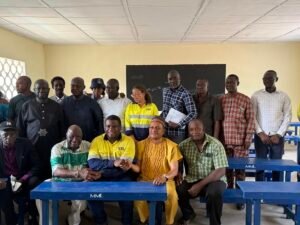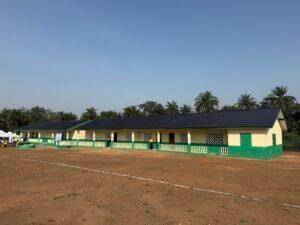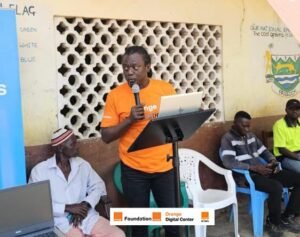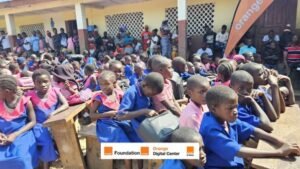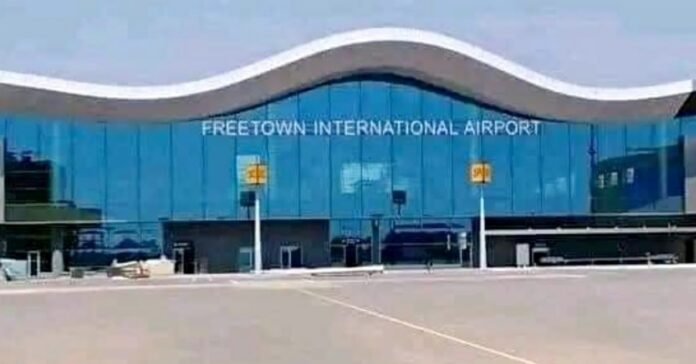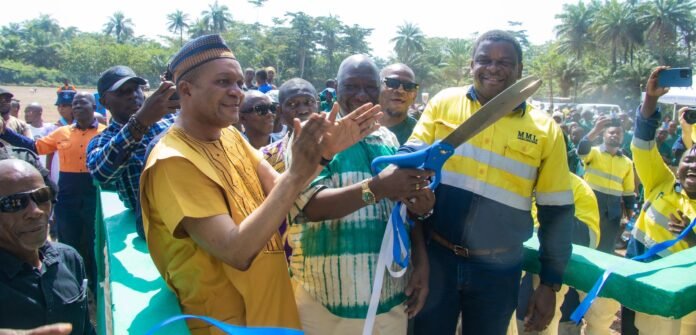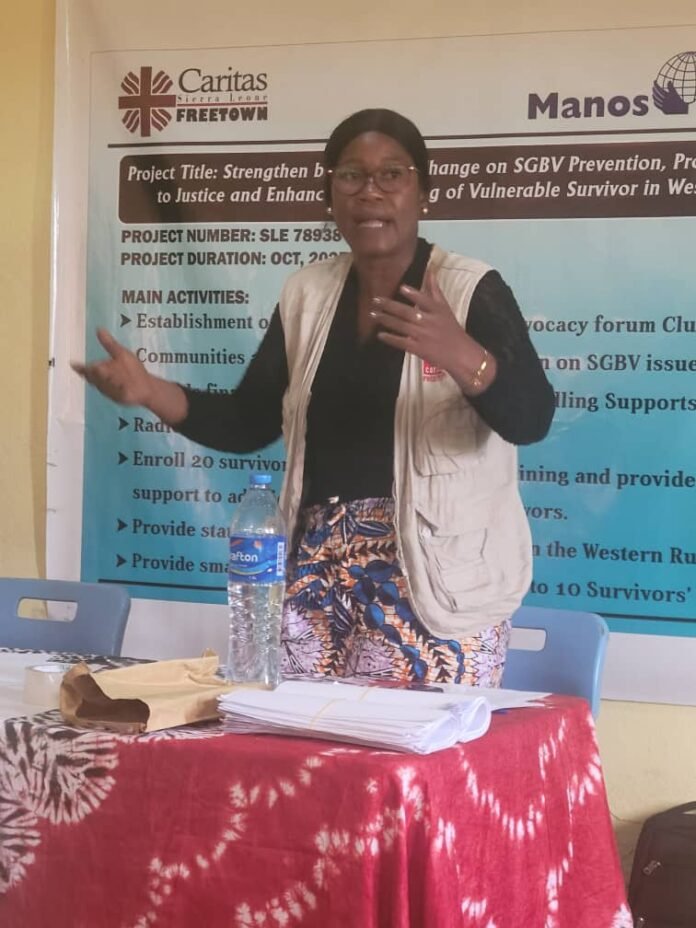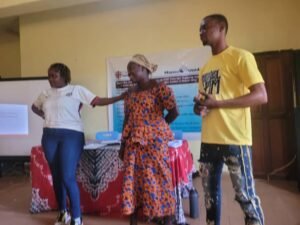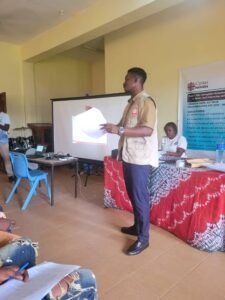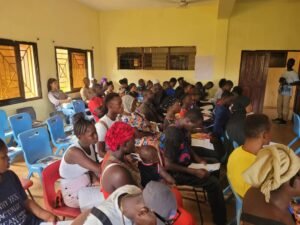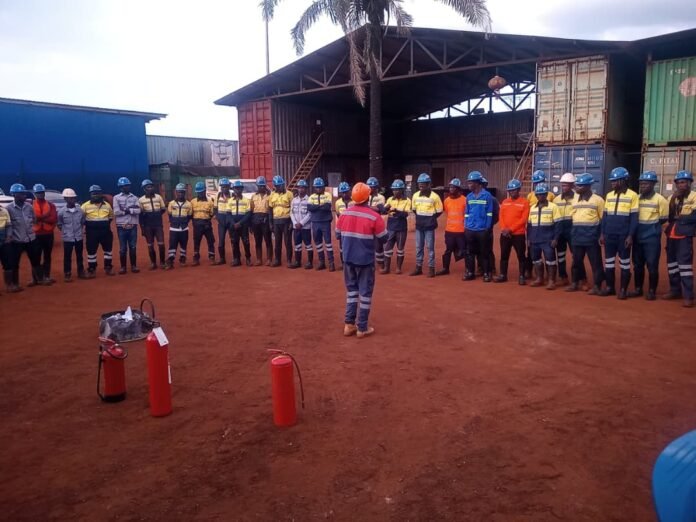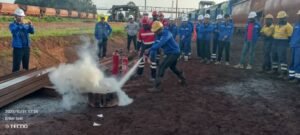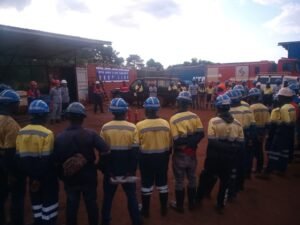By Foday Moriba Conteh
Marampa Mines Limited (MML) officially commissioned and handed over the newly constructed Kulafai Rashideen Islamic Primary School in Maforki Village, Marampa Chiefdom, in a ceremony attended by community leaders, education stakeholders, Government officials, parents and pupils. The modern facility features six classrooms, a six-room toilet block, two hand-pump water wells, an administrative office, an assembly area, a football field and a fully fenced compound, designed to serve over 200 pupils from Maforki and neighbouring communities including Magbil, Magberie, Manonkoh and Magbainkthay. The school was furnished with essential learning materials, desks, chairs, books and other supplies, with donations from partners. The total construction cost amounted to US$175,000.
Paramount Chief, Marampa Chiefdom, PC Bai Koblo Queen II described the project as a “major milestone” in the development of Marampa Chiefdom, highlighting the positive impact of mining on education, infrastructure and livelihoods. He reflected on the historical challenges following the closure of earlier mining operations and praised efforts to restore mining activities in the area.
The Paramount Chief emphasized the role of the 1% community development fund, noting that it has supported scholarships, teacher welfare and improved educational infrastructure. “This school is a symbol of progress for Maforki and the entire chiefdom. Education remains a key driver for development and we will continue to partner with MML to enable our children to become future leaders of Sierra Leone,” he said, urging parents to prioritize their children’s education.
Speaking for MML, Anthony Mansaray, Project Manager, explained that the relocation was motivated by safety concerns, as the former school was located less than 50 meters from the Valley B Tailings Storage Facility. He outlined the extensive consultations, stakeholder engagements and Government approvals that preceded construction and acknowledged the Kamara family for donating three acres of land for the project.
The construction, carried out by local contractor, YA Marie Investment, was supervised by the MML Projects Team to ensure quality. Anthony Mansaray expressed optimism that the new learning environment would positively impact pupils’ performances.
Gibrilla A. Sesay, Deputy Director of Education, Port Loko District, praised MML for complementing Government efforts to expand access to quality education. He assured that the Ministry of Basic and Senior Secondary Education would continue monitoring the school to ensure quality teaching and encouraged parents to support their children’s learning. He also urged teachers to pursue professional qualifications and licensing, promising Government support for certified teachers to be placed on payroll.
Safea Ndomaina, Deputy Development Secretary, Ministry of Planning and Economic Development, highlighted the project’s contribution to human capital development and acknowledged the role of Government in approving the school relocation and resettlement of nearby households. He commended MML for transparency, compliance with national resettlement policies and investment in community welfare.
Ibrahim Satti Kamara, Director of Communications and Community Affairs at the National Minerals Agency, described the initiative as evidence of responsible corporate presence, emphasizing the alignment of MML’s investment with national priorities for human capital development. He encouraged other companies in Sierra Leone to emulate MML by investing in meaningful community projects.
John David Cooper, Director of Policy, Ministry of Mines, representing Minister Julius Daniel Mattai, said the project reflects a commitment to placing people at the center of development and demonstrates that mining and community welfare can progress hand in hand. He stressed that education is a key pillar of national development and urged the community to take ownership of the school.
On his part, Resident Minister North-West, Ambassador Alhaji Umar Bond Wurie, praised Marampa Mines Limited (MML) for constructing the newly relocated Kulafai Rashideen Islamic Primary School in Maforki, describing the project as a major step toward improving learning conditions in mining-affected communities.
He also hailed the implementation of the 1% community development initiative for mining areas, explaining that the policy was initiated when he served as Permanent Secretary in the then Ministry of Mines, but only began to be implemented after the current administration returned to office.
“The completion of this beautiful school shows the commitment of Marampa Mines to the people of Marampa and Maforki,” he said.
Ambassador Alhaji Umar Bond Wurie encouraged community residents to continue working closely with the company and Government institutions to foster peaceful relations and ensure long-term benefits for local people. He urged residents to prioritize dialogue over confrontation in addressing concerns related to mining operations.
He further emphasized that national development must rise above political divisions, saying progress will only be achieved when communities and Government institutions jointly support initiatives aimed at improving living standards.
Ambassador Alhaji Umar Bond Wurie concluded by reiterating Government’s commitment to ensuring that communities benefit fairly from mining activities, while calling for continued cooperation and patience as development projects unfold within the district.
In his keynote address, Managing Director of Marampa Mines Limited, Angula Kalili, said the handover demonstrates the company’s commitment to community development, safety and inclusive progress in its operational chiefdom. He noted that the relocation became necessary due to the close proximity of the former school structure to the company’s Tailings Storage Facility.
The new facility comprises six fully furnished classrooms, an administrative office, a six-room toilet block, two hand pump water wells, a fenced compound for safety and a recreational space. Learning materials were also donated by Marampa Mines.
Angula Kalili expressed gratitude to the Kamara family for donating the land on which the school now stands and applauded local contractor Ya Marie Investment as well as the MML project team for successfully delivering the work.
He emphasized that the intervention aligns with the vision of Marampa Mines’ Board Chairman, Craig Dean, and supports the Government’s education priorities. “This investment is not just about a building; it is about empowering future leaders,” he said, assuring that the company remains committed to community welfare and sustainable development in the chiefdom.
The event which underscored a shared commitment among Marampa Mines, Government authorities and the community to improve educational infrastructure, ensure pupil safety and foster sustainable development in Marampa Chiefdom and beyond was climaxed by official commissioning of the school by the Angula Kalili, Managing Director of MML, Paramount Chief, Marampa Chiefdom, PC Bai Koblo Queen II and the Ambassador Alhaji Umar Bond Wurie, Resident Minister North-West followed by conducted tour of the facility.

